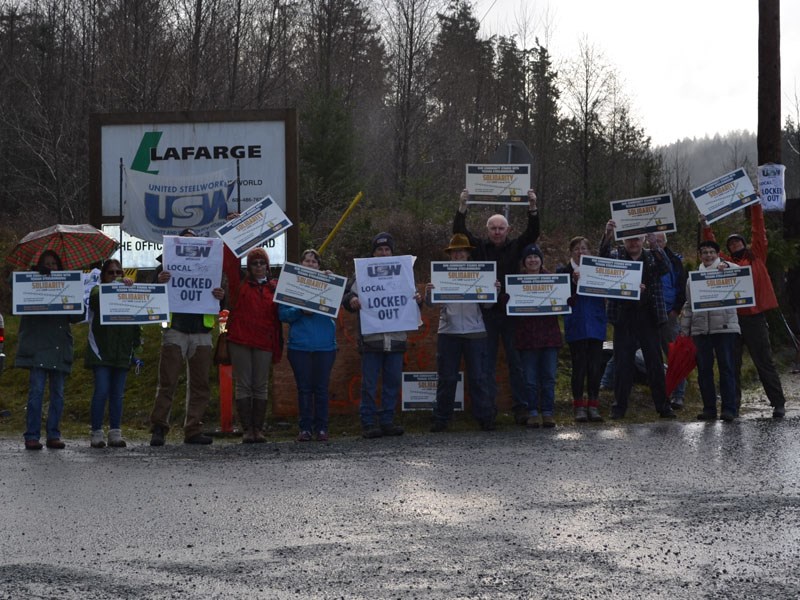As the lockout at Texada Quarrying limestone mine enters its sixth week, the union representing workers said it is resolute in its stance on seniority rights.
United Steelworkers Local 816 president Mickey Pancich, who represents 90 workers in the quarry, said the labour dispute is taking its toll on the island community.
“It’s going to be a long haul here, so we’re just trying to get some community support out there,” said Pancich.
Local 816 has not been working since quarry owner LafargeHolcim locked workers out on October 17.
Approximately 160 Texada residents attended Local 816’s community rally Wednesday, November 23, in Lafarge Park.
United Steelworkers District 3 staff representative Earl Graham said the rally was key to letting the community know what is going on.
“Community is extremely important, especially when you live on a small island,” he said. “When they really listen to what is going on they are all appalled.”
LafargeHolcim communications director Jennifer Lewis said that given the bargaining committee’s rejection of the offer without a membership vote, and its issuance of strike notice without leaving the premises, the company had no option but to move to a lockout situation in order to manage the business.
Powell River Regional District Texada Island director Sandy McCormick said with the quarry being the largest employer on Texada, any work disruption has a negative impact on the entire island. She hopes the two sides can put aside their differences and resolve the outstanding issue of seniority as soon as possible.
“With the loss of employment during the lockout, there is also a loss of income to support families of workers and to spend at local businesses,” said McCormick.
Texada has a long history of mining limestone that dates back to as early as 1918. The limestone mine is the oldest in the province.
The lockout came after months of negotiations and mediation. Incremental progress was made on wages and benefits, but negotiations came to a halt with the company’s demand in the current offer to alter how employees are organized for work.
Graham said he has spoken with the company’s negotiator on several occasions asking if the employer is at the point it wants to withdraw its offer and go back to negotiations, but each time the company has not given its negotiator a directive to do so.
According to Lewis, the fundamental benefits that seniority provides remain in the current offer.
“Seniority still provides for job security during layoffs, overtime allocation and vacation scheduling,” she said. “Our offer may have an impact on the application of seniority with respect to assignment of work.”
Lewis explained that the current offer reduces the current 22 classifications down to three. Anyone in the classification can be assigned to a job the company determines they are qualified to do, she added.
“This allows the company to assign work more efficiently, increase our productivity and support our sustainability initiatives,” said Lewis.
Graham said the reduction of classification levels is unacceptable to the local and it has more to do with the company wanting to have more control over who it chooses to stand in for sick or absent workers than creating efficiencies.
Seniority rights have been a part of the contract for workers at the quarry since it certified in 1947.
“There’s absolutely no way these workers will give up their seniority rights,” said Graham. “If we can’t get this off the table it will be literally impossible for us to get to a collective agreement.”
Lewis said the company trusts in the negotiation process to end the dispute.
“We appreciate their safe, dedicated and diligent work,” said Lewis. “We would like to see a fair agreement that meets everyone’s needs.”



